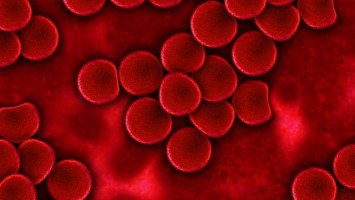
by ecancer reporter Clare Sansom
One of the main mechanisms through which the immune system acts to eliminate tumours is by triggering phagocytosis of tumour cells by immune cells.
This process may be initiated by pro-phagocytic signals or inhibited by anti-phagocytic ones on the surface of potential target cells.
The transmembrane protein CD47, which may be expressed on the surface of many cell types, is an immunoglobulin that inhibits phagocytosis by binding to a receptor expressed on the surface of macrophages,
This protein can be expressed on the surface of cells from both haematopoietic and solid human cancer types, and high expression levels have been seen to correlate with poor survival.
Monoclonal antibodies that bind to CD47 and block its activity have been shown to be effective in clearing a variety of tumours from mice, and most of these studies suggested that inactivating CD47 triggers phagocytosis of tumour cells by macrophages.
However, these studies were all carried out in immunodeficient mice lacking T-cells and therefore could not determine the extent to which these cells are involved in this process.
A group of Chinese and US researchers led by Yang-Xin Fu of the Institute of Biophysics, Chinese Academy of Sciences, Beijing, China, have now used immuno-competent mouse models to investigate the involvement of the adaptive immune system in anti-tumour CD47 blockade.
Firstly, they inoculated immunocompetent mice with B-cell lymphoma cells expressing CD47 followed seven days later with an anti-CD47 antibody and monitored tumour growth.
Tumours grew more slowly in the mice that had received the antibody, and they survived for longer.
Similar results were obtained when similar mice bearing established solid tumours were injected with the same antibody.
Injecting the antibody directly into tumours had dramatic effects, showing complete tumour regression after only two low doses of antibody: blocking the CD47-receptor interaction directly using a fusion protein had a similar effect.
The researchers next set out to establish the extent to which this reaction depended on T cells by injecting anti-CD47 antibody into tumours in a similar but T-cell deficient strain of mice.
A longer course of anti-CD47 injections was required to suppress tumour growth in these mice, and the suppression was only transitory.
Repeating this experiment using mice with selective deletion of either CD4 or CD8 T cells showed that the anti-tumour response only required the CD8 T cell subset.
Fu and his co-workers then re-injected mice that had rejected tumours following anti-CD47 treatment with further cancer cells and found that no tumours became established, showing that this treatment had the potential to prevent relapse.
Next, the researchers investigated whether macrophages or dendritic cells were involved in stimulating (or cross-priming) naïve cytotoxic CD8 T cells with and without anti-CD47 treatment using in vitro cultures of bone-marrow derived cells of both types.
The dendritic cells were found to cross-prime the T cells more effectively than the macrophages, particularly in the presence of anti-CD47 antibody.
Similar results were obtained in a mouse model: primary dendritic cells but not macrophages obtained from the tumour micro-environment were able to cross-prime T cells to reject several types of tumours.
Tumour-bearing transgenic mice from a strain in which dendritic cells could be depleted using diphtheria toxin were treated with both this toxin and anti-CD47, and the anti-tumour effect of the antibodies was found to be reduced by dendritic cell depletion.
However, selective removal of macrophages had no effect on the anti-tumour response.
These findings further suggested that cross-priming of T cells by dendritic cells only was necessary for the anti-tumour effect of anti-CD47.
The researchers also showed that the response could be impaired by blocking type 1 interferon signalling in dendritic cells.
Further analysis implicated an innate immune protein known as STING that senses the presence of cytosolic DNA and stimulates interferon genes in the anti-tumour response triggered by CD47 blockade.
These findings confirm that this anti-tumour process involves interaction between the innate and adaptive immune systems.
Clinical trials of anti-CD47 antibodies are under way in several tumour types, but it has been suggested that suppression of the adaptive immune system by standard chemotherapy agents might cause problems if anti-CD47 was to be combined with these drugs.
Finally, Fu and his co-workers treated their tumour-bearing mice with cyclophosphamide or paclitaxel before or after anti-CD47, and showed that chemotherapy given before anti-CD47 synergised with this treatment whereas it had a detrimental effect when given afterwards.
This suggests that the timing of any combination of chemotherapy with anti-CD47 in treating human patients might have a significant effect on the outcome.
Reference
Liu, Pu, Cron et al. (2015) CD47 blockade triggers T cell–mediated destruction of immunogenic tumors. Nature Medicine, published online ahead of print 31 August 2015.